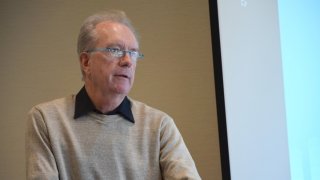After a long and decorated career as a professor of higher education, William G. Tierney knows who he is, or at least who he wants to be.
He’s not sure universities can say the same about themselves.
In academic terms, Tierney is a USC University Professor, the Wilbur-Kieffer Professor of Higher Education at USC Rossier and co-director of the Pullias Center for Higher Education.
Tierney announced his plans to retire this December, and as one of his final projects at USC, has been examining how higher education can support democracy and how, more recently, it hasn’t, an outcome of an identity crisis that has reduced higher education as a force for democratic good.
Speaking at USC Rossier’s annual Pullias Lecture this week, Tierney made the resulting problem plain: “We are in the midst of a democratic recession.”
Schisms
In 2016, Tierney accepted a Fulbright Fellowship in India. He returned home to a country that had elected a populist as president.
“The election of Donald Trump,” Tierney said, “forced me to think not only what my reaction should be, but what about the university?”
Tierney posited that universities have allowed themselves to be swept up by the effects of a global economy that prioritize efficiency and production, turning higher education from a public good into a commodity.
“The importance of faculty involvement in governance of an institution is a waste of time when compared to the colleague who generates external grants,” Tierney said. “Part-time faculty are cheaper than full-time—why not outsource all work that can be done more cheaply?”
Those tendencies, Tierney said, combined with “a false neutrality of disinterestedness,” have prevented universities from being the vanguards of democracy that they have historically been, pointing to the role of higher education in being a vital part of India’s post-British independence or helping establish social mores in the United States.
Since 2000, more than two-dozen countries have seen their democracies diminished or dismantled, Tierney said, and not necessarily by military coups, but by an erosion of institutional checks like higher education.
“[Our] distance and disinterestedness—in my mind—is no longer sufficient in a world where we are facing a democratic recession.”
Tierney argued that as universities have lost their identities, they have in turn lost claim to establishing what is true (“people make their own facts”); become seen as a vehicle for careers rather than institutions for public good; and experienced a loss of autonomy.
“Intellectuals in our nation’s universities should represent the conscience of society,” he said. “We shape the conditions in which future generations learn about themselves and their relations to the outside world.”
Speaking out
If the ideal is a university and faculty that use their voices for good, Tierney is an expert.
“The most important thing Bill has given this university is his critique,” said Provost Michael Quick. “To call bullshit when he sees it, to demand more of all of us. His critiques have always come from a place of love, for USC and for higher education in general. It’s about living up to our great and highest ideals, and Bill has always held us to those high standards.”
Indeed, as the University of Southern California has faced a series of issues in the past year, Tierney has shown the willingness to be publicly outspoken. As he prepares to leave USC and turn his investigation of higher education and democracy into a book, he has encouraged others to not show the same disinterestedness that he sees diminishing democracy.
“I hope that you use your voice, that you don’t stifle it,” he said. “Speak your mind.”





